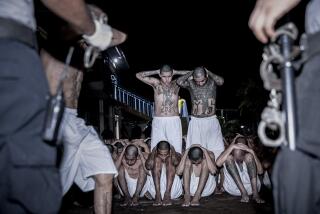Tijuana Rights Group Says Abuse of Minors Continues Under New Government
TIJUANA — A human rights group here charged Wednesday that beatings, sexual abuse and torture of minors in police custody continue to be commonplace in this border city, despite the inauguration last year of a new, opposition state government that pledged to do away with such abuse.
An investigation by the Binational Center of Human Rights, headed by Victor Clark Alfaro, a well-known anthropologist and rights activist, has uncovered 68 instances of official torture against youths since Nov. 1, when opposition Gov. Ernesto Ruffo Appel took office in Baja California. Another seven cases were found to have occurred last year under the previous administration.
“Torture of minors continues to be a common police practice,” Clark said at a news conference in his office here.
Among the methods commonly used, Clark charged, were beating youths with hands, fists, gun butts and other objects; administering electric shocks to minors’ extremities and genitals; the near-asphyxiation of victims by placing plastic bags over their heads; and the near-drowning of young prisoners by dunking their heads in water or forcing water up their noses with hoses.
These tactics are generally employed in Tijuana and elsewhere in Mexico, Clark charged, to coerce confessions from youths accused of a range of crimes, although theft and robbery are the most common accusations.
Among the more sadistic cases, Clark said, is that of a 14-year-old boy housed at a juvenile detention facility here who said guards stuffed onions in his mouth when he suffered from an epileptic fit.
In 1987, Clark’s group announced that a similar investigation had uncovered more than 100 cases of torture directed at minors in police custody. Despite widespread dissemination of the charges and the filing of formal complaints, those allegations never prompted institutional changes or any kind of disciplinary action against the torturers. Clark said he is hopeful that the new government will be more likely to respond, and the human rights group said it planned to send a letter to Gov. Ruffo demanding an investigation.
Gabriel Rosas, a spokesman in Tijuana for Gov. Ruffo, said any charges of such abuse will be investigated, but that officials had only heard of “isolated” allegations of torture, which have always been thoroughly examined. “Gov. Ruffo does not accept torture,” Rosas said.
Interviews with dozens of youths, Clark charged, also revealed evidence of sexual abuse of minors, among them two juveniles housed at the Council for Orientation and Reeducation for Minors of Antisocial Conduct, a detention center where 120 youths are now held for various infractions.
In addition, the human rights group accused officials at the facility with a range of other abuses, including the extortion of bribes from Central American youths housed at the site and the refusal to provide appropriate medical care to youths, among them a boy suffering from asthma. The group also charged that minors are also frequently housed with adult criminals in the state penitentiary, a practice that is against the law.
Carlos Salas Aceves, deputy state director in Baja California for Social Prevention and Re-adaptation, categorically denied that any such abuses had occurred at the Tijuana facility since Nov. 1, when the Ruffo administration took office. “Those things did not happen during our time here,” Salas said during an interview at the Tijuana facility. “We have nothing to hide.”
Of the abuses uncovered, the rights group said the majority occurred at the hands of the Baja California State Judicial Police, which is charged under Mexican law with investigating most common crimes, including assault, robbery and murder.
Jose Encinas Filatoff, commander of the 325-member state police unit in Tijuana, said allegations of abuses will be fully investigated once formal complaints are filed.
But Clark, the human rights activist, said that the police are not capable of investigating themselves, and that the governor should conduct a separate inquiry.
Among the agencies also involved in torture, the human rights group alleged, were the Tijuana municipal police and the Federal Judicial Police.
More to Read
Sign up for Essential California
The most important California stories and recommendations in your inbox every morning.
You may occasionally receive promotional content from the Los Angeles Times.










